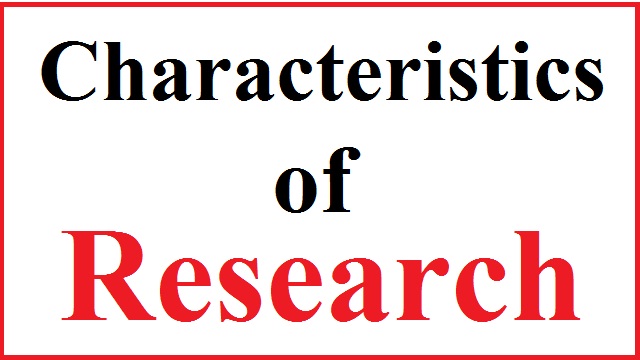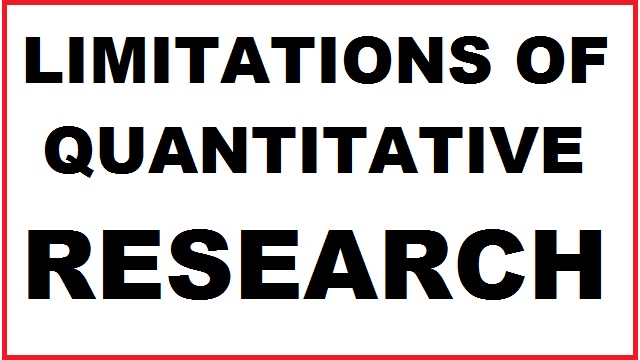Characteristics of Research
Characteristics of Research
Introduction
Research is an original and systematic investigation undertaken to increase existing knowledge and understanding of the unknown to establish facts and principles. Some people consider research as a way of discovery of new knowledge. It comprises the creation of ideas and the generation of new knowledge that leads the development of new materials, devices, products, processes etc. It should have the potentials to produce results that are sufficiently relevant to increase, correct and correlate previous knowledge. Research produces theories and hypotheses and attempt to analyze facts and phenomena.
The word ‘research’ perhaps originates from the old French word “recerchier” that meant to ‘search again.’ It assumes that the earlier search was not completed so a repeated search is needed.
In practice, the term ‘research’ refers to a scientific process of generating an unexplored horizon of knowledge, aiming at discovering or establishing facts, solving a problem, and reaching a decision. The systematic investigation into and study of materials and sources in order to establish facts and reach new conclusions:
Characteristics of Research
Certain terms are commonly used in research and the success of any research depends on these terms. These terms determine whether a research is scientifically and ethically correct. They are called the characteristics of research. These characteristics have been explained here in simplest terms to understand and to implement. The real understanding of these characteristics is only possible when you practically conduct a research.
Reliability is a measure of repeatability of any research, research instrument, tool or procedure. The extent to which an experiment, test or measuring procedure yields the same results on repeated trials. If any research yields similar results each time it is undertaken with similar population and with similar procedures, it is called to be a reliable research. Reliability adds to the consistency and predictability of research.
Validity is the strength with which we can make research conclusions assumptions or propositions true or false. It is the state of being acceptable according to the law. It determines the applicability of the research. Some researchers say that validity and reliability are co-related, but the validity is much more important than reliability. Without validity, research goes in the wrong direction. To keep the research on-track define your concepts in the best possible manner so that no error occur during the measurement.
Accuracy means that each process in the research has been undertaken accurately i.e able to give an accurate result. It is also the degree to which each research process, instrument and tool is related to each other. So choosing the best data collection tool improves the accuracy of research.
Credibility comes with the use of the best source of information and best procedures in research. the quality of being trusted and believed in: If you are using second-hand information in your research due to any reason your research might complete in less time but its credibility will be at stake because secondary data has been manipulated by human beings and is therefore not very valid to use in research. A certain percentage of secondary data can be used if the primary source is not available.
Generalizability: The term that applies to the accuracy with which results or findings can be transferred to situations or people other than those originally studied is the extent to which a research findings can be applied to larger population. When a researcher conducts a study he/she chooses a target population and from this population he takes a small sample to conduct the research. This sample is representative of the whole population so the findings should also be representative of the whole population
Empirical nature of research means that the research has been conducted following rigorous scientific methods and procedures. Each step in the research has been tested for accuracy and is based on real life experiences. Quantitative research is easier to prove scientifically than qualitative research. In qualitative research biases and prejudice are easy to occur. There are tools that can improve the trustworthiness of qualitative research. The qualitative researcher should know how to control biases and subjectivity that can make a research less scientific.
Systematic: Every research follows an approach or paradigm. This systematic approach helps the researcher understand the steps to be taken and in what order to take each step. There are set of procedures that have been tested over a period of time and are thus suitable to use in research. Each research, therefore, should follow a procedure.
Controlled: In real life experience there are many factors that affect an outcome and a single event is often a result of several factors. When similar event is tested in research, due to the broader nature of factors that effect that event, some factors are taken as controlled factors while others are tested for a possible effect. The controlled factors or variables should have to be controlled rigorously.
In pure sciences, it is very easy to control such elements because experiments are conducted in the laboratory but in social sciences it becomes difficult to control these factors because of the nature of research. In social science the experiments and observations are done in real life settings. To control external factors that might effect the research is difficult in social science research. However there are tools that can help the researcher in achieving some control over how the research goes on.
Educational research
It refers to the systematic collection and analysis of data related to the field of education. Research may involve a variety of methods and various aspects of education including student learning, teaching methods, teacher training, and classroom dynamics. Educational researchers may draw upon a variety of disciplines including psychology, sociology, anthropology, and philosophy.
There is no single correct way of conducting research in the field of education.
General Characteristics of Educational Research
v Educational research attempts to solve a problem.
v Research involves gathering new data from primary or first-hand sources or using existing data for a new purpose.
v Research is based upon observable experience or empirical evidence.
v Research demands accurate observation and description.
v Research generally employs carefully designed procedures and rigorous analysis.
v Research emphasizes the development of generalizations, principles or theories that will help in understanding, prediction and/or control.
v Research requires expertise—familiarity with the field; competence in methodology; technical skill in collecting and analyzing the data.
v Research attempts to find an objective, unbiased solution to the problem and takes great pains to validate the procedures employed.
v Research is a deliberate and unhurried activity which is directional but often refines the problem or questions as the research progresses.
v Research is carefully recorded and reported to other persons interested in the problem.
Conclusion
Educational research is considered to be really effective in the improvement of education and keeping the education system up with the current high pace of advancement in other industries. Education is considered as a vital tool for social as well as national development. It has significant role in evaluating the human development of a country. Educational research helps to improve the quality of education with the various methods and help institutes and nation as well to improve the efficiency of students and teachers. Educational research can be really effective and help educational institutes to improve the obstacles they are facing and hence, educational research have the potency to make any educational institutes exceptional with their results. There is no organization in the world without any obstacle or challenge, but educational institute can use educational research to overcome those obstacles and perform better
References
v Wikipedia, Characteristics of Research, https://en.wikiversity.org/wiki/Characteristics_of_research
v Kumar R. (2011). Research Methodology: A Step-by-Step Guide for Beginners. 3rd Edition. Sage Publications: London. Pp- 28-29.
v https://www.iedunote.com/research-definition-characteristics-goals-approaches




Comments
Post a Comment